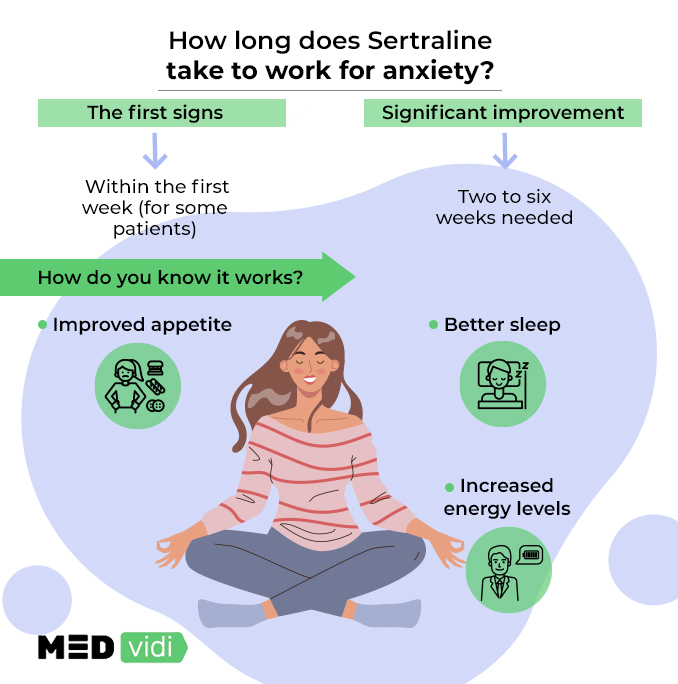Anxiety can be a debilitating condition affecting one’s social, professional, and even academic life. Thankfully, patients have an array of treatment options. Among them is medications, and one of the most effective ones is Sertraline.
What Is Sertraline?
Sertraline is a generic version of the brand name
Thanks to its success and tolerable side effects, Sertraline is one of the most prescribed medications for generalized anxiety disorder treatment. For optimal results, patients taking Sertraline for anxiety should also attend cognitive therapy.
What Is Sertraline Approved for?
The FDA approved the use of Sertraline in 1991 for several conditions, including:
- Major Depressive Disorder (MDD)
- Premenstrual Dysphoric Disorder (PMDD)
- Obsessive Compulsive Disorder (OCD)
- Panic Disorder (PD)
- Post Traumatic Stress Disorder (PTSD)
- Social Anxiety Disorder (SAD) or social phobia
Sertraline can help improve the overall mood of a patient. Often, this effect restores their interest in daily living, decreases fear and the intensity of unwanted thoughts, reduces the volume of panic attacks, and decreases generalized anxiety. Sertraline achieves these effects by restoring and maintaining the chemical balance in the brain by providing higher levels of serotonin.
Due to its widespread use it is classified as an essential medicine by the World Health Organization, and in one
Sertraline Dosage for Anxiety
Sertraline is available in both tablet and oral solution forms. The tablets come in three strength dosages: 25 mg, 50 mg, and 100 mg. In general, the Zoloft dosage for anxiety is usually 25 mg to 50 mg a day.
The liquid version is available in a 60 ml bottle. The liquid has a menthol scent and is a clear and colorless solution. It contains 20 mg of sertraline for every milliliter. The medication also has a dropper calibrated at 25 mg and 50 mg points. It can be mixed with 4 ounces/120ml or half a cup of water, lemonade, lime soda, orange juice, or ginger ale before consumption. Patients should prepare a mixture at their dosing time and not in advance.
Sertraline can be taken with or without food, and it can be dosed either in the morning or evening. It is important that patients take the medication as per the doctor’s instructions. When selecting a dose, the doctors consider factors like the severity of anxiety symptoms, tolerance to the side effects of Sertraline, and other concomitant conditions.
How Long Does Sertraline Take to Work for Anxiety?
The mechanism of action for Sertraline means you will not see an immediate change. It takes time for serotonin to build up in the brain. Due to this some people will likely notice a change within the first week of treatment.
It takes about one week for the sertraline levels to build up in the body and then several days to weeks for the body to adapt to its effects. Generally, it takes three to six weeks for the full benefits to be realized. Early symptom relief effects are usually an improved appetite, better sleep, and increased energy levels.

Sertraline: Side Effects
Sertraline: Side Effects
- Fatigue
- Nervousness
- Nausea
- Trouble sleeping
- Headaches
Severe side effects are:
- Allergic reaction
- Seizures
- Tremors
- Yellowing of the eyes
- Suicidal thoughts
- Consistent vomiting
- Changes in urine and stools
- Increased bleeding
- Sexual problems
Alternatives to Sertraline for Anxiety
Taking Zoloft for anxiety works for many people. Most antidepressants work for
- Other selective serotonin reuptake inhibitors: include citalopram (Celexa), fluoxetine (Prozac), paroxetine (Paxil and Pexeva), and escitalopram (Lexapro).
- Serotonin and norepinephrine reuptake inhibitors: these medications act on both serotonin and norepinephrine. They include levomilnacipran (Fetzima), duloxetine (Cymbalta), desvenlafaxine (Pristiq), and venlafaxine (Effexor XR).
- Atypical antidepressants: these are medications that do not fit in the other standard categories. They include bupropion, trazodone, mirtazapine, and vilazodone.
- Tricyclic antidepressants: These drugs tend to cause more side effects, so they are usually prescribed if a patient has no response to other types of antidepressants.
- Monoamine Oxidase Inhibitors: these act on the enzyme monoamine oxidase and are used for conditions that do not respond to other treatments. They include phenelzine, isocarboxazid, and tranylcypromine.
Summing Up
The effects of Sertraline may not be seen in the first few days, but more likely in 1-3 weeks with maximum benefit at 6 weeks. It is approved by the FDA for treating several depression and anxiety disorders. Medication, its dosage, and additional treatment aspects are determined individually by the doctor. If you want to know which medication will help you best, contact MEDvidi today and book an appointment with a mental health expert.













